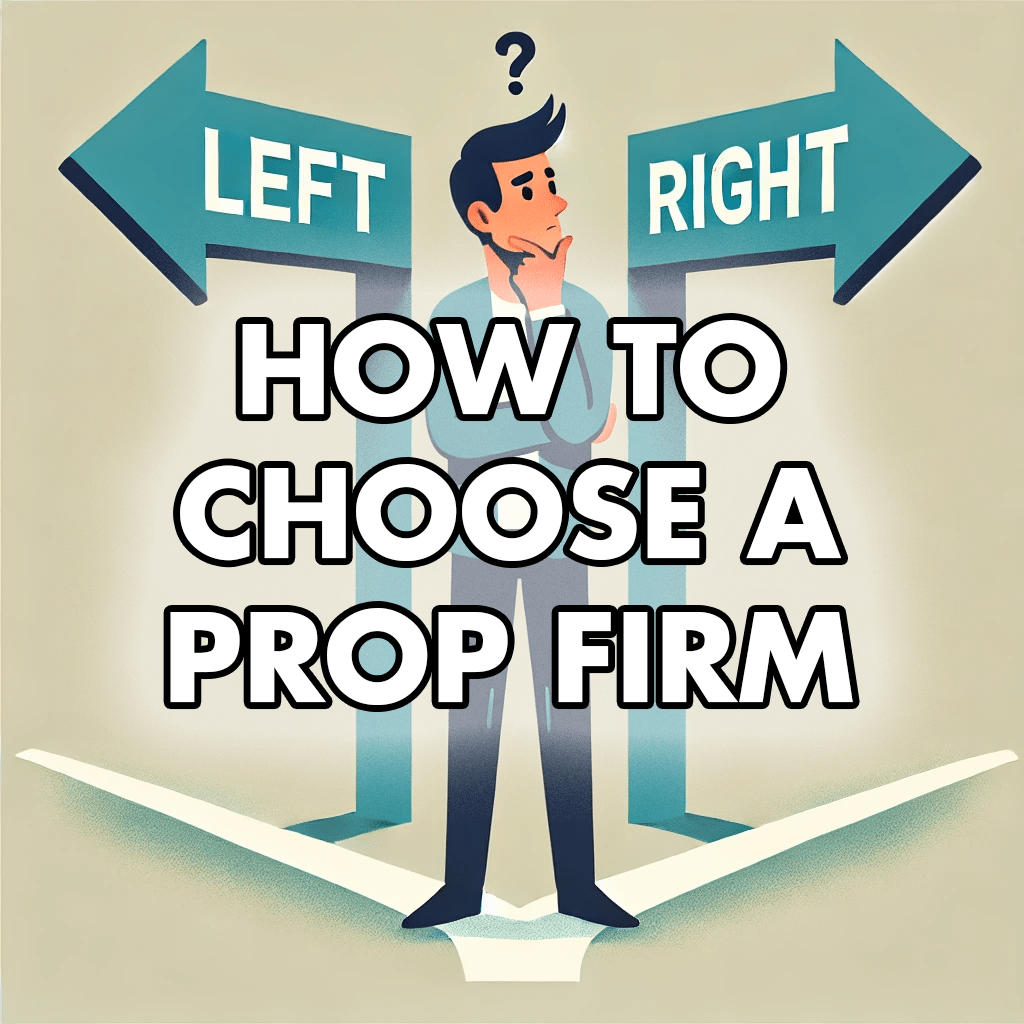How to Choose a Prop Firm: A Comprehensive Guide for Traders in 2025
Table of Contents
Toggle
Are you a skilled trader looking to take your career to the next level? Have you ever wondered how to access more capital, reduce your risk, and trade with the backing of a professional firm? If so, joining a proprietary trading firm (prop firm) might be the perfect solution for you.
But here’s the million-dollar question: How do you choose the right prop firm for your trading style and goals?
With so many options available, it can feel overwhelming to make the right decision. That’s where I come in. As a trading coach specializing in helping traders succeed, I’ve seen firsthand how choosing the right prop firm can transform a trader’s career. In this guide, I’ll walk you through everything you need to know about how to choose a prop firm in 2024.
By the end of this post, you’ll have a clear roadmap to finding the perfect prop firm that aligns with your trading style, risk tolerance, and financial goals. Let’s dive in!
What Is a Prop Firm, and Why Should You Care?
Before we get into the nitty-gritty of choosing a prop firm, let’s start with the basics.
A proprietary trading firm (prop firm) is a company that provides traders with capital to trade financial markets. In exchange, the firm takes a share of the profits. The beauty of prop firms is that they allow traders to access larger amounts of capital without risking their own money.
Why Join a Prop Firm?
Here are some of the key benefits of joining a prop firm:
- Access to Capital: Trade with more money than you could on your own.
- Reduced Risk: Since you’re not using your own funds, your personal risk is minimized.
- Professional Environment: Gain access to tools, resources, and mentorship.
- Profit Sharing: Earn a percentage of the profits you generate.
- Career Growth: Prop firms can be a stepping stone to a full-time trading career.
But not all prop firms are created equal. Choosing the wrong one can lead to frustration, wasted time, and even financial loss. That’s why it’s crucial to know how to choose a prop firm that’s right for you.
Key Factors to Consider When Choosing a Prop Firm
There are several factors you need to consider when evaluating how to choose a prop firm. Let’s break them down one by one.
1. Trading Instruments and Markets
The first thing to consider is the type of markets and instruments the prop firm allows you to trade. Some firms specialize in forex, while others focus on stocks, commodities, or cryptocurrencies.
- Ask Yourself: What markets do I enjoy trading? Does the firm offer those opportunities?
- Pro Tip: If you’re a crypto trader, make sure the firm supports crypto trading. If you’re a forex trader, check if they offer the currency pairs you’re interested in.
2. Funding Model and Profit Split
Prop firms have different funding models and profit-sharing structures. Some firms provide upfront capital, while others require you to pass an evaluation or challenge first.
- Evaluation Challenges: Many firms require you to demonstrate your skills by meeting specific profit targets and risk management rules.
- Profit Split: Typically, prop firms take a percentage of your profits (e.g., 70/30 in your favor). Make sure the split is fair and aligns with your expectations.
Example: Firm A offers an 80/20 profit split but has strict evaluation rules. Firm B offers a 60/40 split but provides more flexibility. Which one is better? It depends on your trading style and confidence level.
3. Risk Management Rules
Every prop firm has its own set of risk management rules. These rules are designed to protect the firm’s capital, but they can also impact your trading style.
- Daily Drawdown Limits: Some firms limit how much you can lose in a single day.
- Maximum Position Size: Check if there are restrictions on the size of your trades.
- Consistency Rules: Some firms require you to maintain a certain level of consistency in your trading.
Pro Tip: Make sure the firm’s risk management rules align with your trading strategy. If you’re a scalper, for example, tight daily drawdown limits might not work for you.
4. Fees and Costs
Joining a prop firm often comes with costs, such as evaluation fees, monthly subscriptions, or software fees.
- Evaluation Fees: Some firms charge a one-time fee to take their evaluation challenge.
- Monthly Fees: Others require ongoing payments for access to their platform or capital.
- Hidden Costs: Be wary of firms with unclear fee structures.
Ask Yourself: Are the fees reasonable compared to the potential rewards?
5. Trading Platform and Tools
The trading platform and tools provided by the prop firm can make or break your experience.
- Platform Compatibility: Does the firm use a platform you’re comfortable with (e.g., MetaTrader, cTrader, or a proprietary platform)?
- Tools and Features: Look for features like advanced charting, risk management tools, and automated trading options.
- Execution Speed: Fast and reliable execution is critical, especially for scalpers and day traders.
6. Reputation and Reviews
Not all prop firms are trustworthy. Before committing, do your due diligence.
- Online Reviews: Check forums, social media, and review sites for feedback from other traders.
- Transparency: A reputable firm will be transparent about its rules, fees, and profit splits.
- Customer Support: Test their customer service to see how responsive and helpful they are.
Pro Tip: Avoid firms with a history of delaying payouts or changing rules mid-evaluation.
7. Scaling Plan
A good prop firm will offer a scaling plan, allowing you to grow your account as you prove your skills.
- Profit Targets: What are the requirements to qualify for more capital?
- Account Growth: How quickly can you scale up?
- Long-Term Potential: Does the firm offer a clear path to trading larger amounts of capital?
8. Educational Resources and Support
If you’re still developing your skills, look for a prop firm that offers educational resources and mentorship.
- Training Programs: Does the firm provide courses, webinars, or one-on-one coaching?
- Community: Is there a community of traders you can learn from and collaborate with?
- Mentorship: Some firms pair you with experienced traders for guidance.
How to Choose a Prop Firm: A Step-by-Step Guide
Now that you know what to look for, let’s walk through the process of choosing a prop firm step by step.
Step 1: Define Your Goals
Before you start researching how to choose a prop firms, take a moment to define your goals.
- What Markets Do You Want to Trade?
- How Much Capital Do You Need?
- What’s Your Risk Tolerance?
- Are You Looking for Short-Term Gains or Long-Term Growth?
Having clear goals will help you narrow down your options.
Step 2: Research Multiple Firms
Don’t settle for the first prop firm you come across. Research at least 3-5 firms and compare their offerings.
- Create a Comparison Chart: List the key factors (e.g., profit split, fees, markets) and compare them side by side.
- Read Reviews: Look for honest feedback from other traders.
Step 3: Test the Waters
Many prop firms offer demo accounts or free trials. Use these to get a feel for their platform and rules.
- Take an Evaluation Challenge: If the firm requires one, see how it aligns with your trading style.
- Test Customer Support: Reach out with questions to gauge their responsiveness.
Step 4: Evaluate the Costs and Benefits
Weigh the costs (e.g., fees, time commitment) against the potential benefits (e.g., capital access, profit split).
- Calculate Your Break-Even Point: How much do you need to earn to cover the fees and start making a profit?
- Consider Long-Term Potential: Will this firm help you achieve your long-term goals?
Step 5: Make a Decision and Commit
Once you’ve done your research, it’s time to make a decision. Choose the firm that best aligns with your goals and trading style.
- Start Small: Begin with a smaller account to test the waters before committing to larger capital.
- Stay Disciplined: Follow the firm’s rules and focus on consistent performance.
Red Flags to Watch Out For
While most prop firms are legitimate, there are some red flags to watch out for when deciding how to choose a prop firm:
- Unrealistic Promises: If a firm guarantees profits or seems too good to be true, it probably is.
- Lack of Transparency: Avoid firms that are vague about their rules, fees, or payout process.
- Poor Reviews: If multiple traders report issues with payouts or customer service, steer clear.
- High Pressure Sales Tactics: Reputable firms won’t pressure you into signing up.
Final Thoughts: Your Path to Success Starts Here
Choosing the right prop firm is a critical step in your trading journey. By following the steps outlined in this guide, you’ll be well-equipped to make an informed decision.
Remember, the key to success is not just finding a prop firm but finding the right prop firm for you. Take your time, do your research, and don’t be afraid to ask questions.
If you’re ready to take the next step but still feel unsure, I’m here to help. As a trading coach, I offer personalized guidance to help you navigate the world of prop trading and achieve your goals.
So, what are you waiting for? Start your journey today and unlock your full potential as a trader.
Private Coaching
If you’re ready to take your trading skills to the next level and want to know how to choose a prop firm, book your free discovery session with me today! We’ll discuss your goals, assess your current trading strategy, and create a personalized plan to align you with the edge of trading like smart money.
